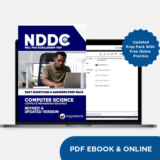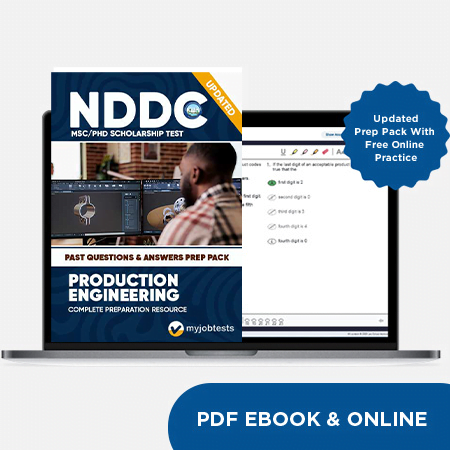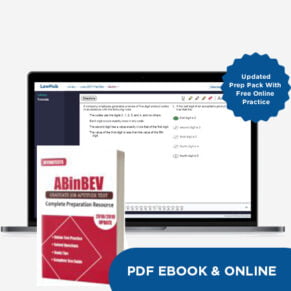- Your bag is empty
- Continue shopping
Bookstore
NDDC Scholarship Past Questions And Answers – Production Engineering
Original price was: $50.$39Current price is: $39.
Up-to-date / Real NDDC Scholarship Production Engineering Test Past Questions and Answer will help you prepare faster and smarter for the NDDC Scholarship. Got shortlisted with few days or hours left to prepare? this pack will give you the insight you need to ace the tests and improve your chance of passing the test.
Looking for a Different Course? Check all NDDC Past Questions Here –>
NDDC Scholarship Past Questions And Answers – Production Engineering
Download the NDDC Scholarship production Engineering Test Past Questions Practice Pack from this page in PDF format. The NDDC Scholarship test past questions pack makes your preparation easier and much better. Featuring questions from previous assessments as well as solutions to these questions.
About NDDC Nigeria
The Niger Delta Development Commission is a federal government agency established by Nigerian president Olusegun Obasanjo in the year 2000 with the sole mandate of developing the oil-rich Niger Delta region of Nigeria.
About The NDDC Scholarship
- The Niger Delta Development Commission (NDDC) Scholarship is a program initiated by the Nigerian government to provide educational opportunities for students from the Niger Delta region. The Niger Delta region is known for its significant oil and gas reserves, but it has also faced numerous socio-economic challenges. One of the ways the government aims to address these challenges is by offering scholarships to qualified students from the region to pursue higher education overseas.
- The amount for the foreign scholarship shall be based on the prevailing exchange rate of the Naira.Current Application Closing Date is 3rd November, 2023.
Application Procedure
- 1.The following documents must be attached to the application:
2.Recent passport photograph
3.Local Government Identification Letter
4.Post Graduate admission letter from a recognized overseas university
Relevant degrees from recognized universities
5.NYSC Discharge/Exemption Certificate
6.Upon successful completion of the application form, a registration number will be automatically assigned.
7.Applicants are advised to print a hard copy of the online-generated acknowledgment for future reference.
8.All shortlisted applicants will be announced and posted on the NDDC website: www.NDDC.gov.ng. These shortlisted candidates will subsequently be required to take part in a Computer-Based Test (CBT). Eligibility
To be eligible for the scholarship, a scholar must hail from the Niger Delta Region and have achieved a First Class Degree, Second Class Upper, or Lower Division.
The Selection Process
- 1. Initial Application: Interested candidates must submit an online application via the Commission’s Website.
2. Preliminary Shortlisting: Candidates will be shortlisted based on the following criteria:
WASSCE/NECO results
3. Undergraduate Degree classification (1st Class, Second Class Upper/Lower)
4. Local Government Identification
5. Computer-Based Test: Shortlisted candidates will undergo a computer-based test conducted by our consultants in Rivers State.
6. Minimum Test Score: Candidates must achieve a minimum score of 70% in the test to proceed to the next stage.
7. Further Shortlisting: Candidates who successfully pass the test will be further shortlisted.
8. Final Verification: The final verification of the candidates will be done through the Local Government Area (LGA) and Community Development Committee (CDC).
About the NDDC Scholarship test format
NDDC overseas scholarship test was conducted by Cinfores-Ltd, between 2010 and 2015. Since 2016, the tests are now conducted by MEIL (MARG Educational International Limited).
The test usually comprises of 2 sections –
1. General questions which everyone will have to sit, and
2. Discipline-based questions.
For example, candidates in Engineering and Science related disciplines could take a mix of science-based questions like maths, English, physics and chemistry for part 1, then discipline-specific questions for part 2. The test usually last between 30 to 60 minutes.
Sample Past Questions And Answers for NDDC Scholarship – production Engineering
- Question1: What is the primary goal of Production Engineering?
A Maximizing profits
B Minimizing production costs
C Optimizing production processes
D Ensuring workplace safety
Answer: C Optimizing production processes - Question2:Which manufacturing process involves shaping materials using a rotating cutting tool?
A Forging
B Casting
C Machining
D Welding
Answer: C Machining - Question3: What is the purpose of Quality Control in Production Engineering?
A Maximizing production output
B Ensuring that products meet quality standards
C Reducing production costs
D Improving employee morale
Answer: B Ensuring that products meet quality standards - Question4:Which production system aims to produce products in small batches, often with customization?
A Mass production
B Lean production
C Batch production
D Continuous production
Answer: C Batch production - Question5:What is the primary objective of Value Stream Mapping (VSM) in Lean Manufacturing?
A Eliminating waste
B Maximizing production speed
C Reducing production costs
D Increasing product complexity
Answer: A Eliminating waste - Question6:Which material removal process involves the use of abrasive grains bonded to a wheel?
A Drilling
B Milling
C Grinding
D Turning
Answer: C Grinding - Question7: What does the term “Six Sigma” represent in Production Engineering?
A A quality improvement methodology
B Six production stages
C A type of manufacturing equipment
D Six standard operating procedures
Answer: A. A quality improvement methodology - Question8: Which manufacturing process involves heating a metal to a high temperature and then cooling it to change its properties?
A Welding
B Forging
C Extrusion
D Casting
Answer: B ForgingQuestion9:What is the primary function of a CNC (Computer Numerical Control) machine?
A Human resource management
B Automated machining operations
C Quality control inspections
D Inventory management
Answer: B Automated machining operationsQuestion10: In Just-In-Time (JIT) manufacturing, what is the main objective concerning inventory?
A Maximize inventory levels
B Minimize inventory levels
C Maintain constant inventory levels
D Fluctuate inventory levels based on demand
Answer: B Minimize inventory levels - Question11: What is the primary objective of Kanban in production management?
A Reduce lead times
B Increase machine utilization
C Automate production processes
D Maximize production volume
Answer: A Reduce lead times - Question12: Which statistical tool is commonly used for analyzing variations in production processes and identifying their sources?
A Pareto Chart
B Gantt Chart
C Pie Chart
D Bar Chart
Answer: A Pareto Chart - Question13: What is the role of a Bill of Materials (BOM) in production planning?
A Managing employee schedules
B Identifying equipment maintenance needs
C Listing the materials required for production
D Analyzing financial statements
Answer: C Listing the materials required for production - Question14: Which type of manufacturing process is used to create complex shapes by injecting material into a mold cavity?
A Casting
B Extrusion
C Injection molding
D Forging
Answer: C Injection molding - Question15: What is the primary purpose of Failure Mode and Effects Analysis (FMEA) in production engineering?
A Enhance employee training
B Improve product design
C Reduce production costs
D Identify and mitigate potential failure modes in a process
Answer: D Identify and mitigate potential failure modes in a process - Question16: Which method is used to measure the overall equipment effectiveness (OEE) of a production line?
A Cost accounting
B Time and motion study
C Productivity analysis
D OEE calculation
Answer: D OEE calculation - Question17: In the context of Total Quality Management (TQM), what does the “Deming Cycle” refer to?
A A production scheduling method
B A continuous improvement process
C A safety protocol
D A quality control standard
Answer: B. A continuous improvement process - Question18: What does the term “Kaizen” represent in production management?
A Rapid production expansion
B Continuous improvement
C Strict quality control
D Employee motivation
Answer: B Continuous improvementQuestion19: Which production strategy aims to produce goods only when they are ordered by customers, minimizing excess inventory?
A Lean manufacturing
B Mass production
C Agile production
D Batch production
Answer: A Lean manufacturingQuestion20: What is the primary purpose of Root Cause Analysis (RCA) in production engineering?
A Identifying potential market trends
B Analyzing competitors’ strategies
C Determining the fundamental reasons for process failures
D Calculating return on investment (ROI)
Answer: C Determining the fundamental reasons for process failures
| Select Option | Get eBook, Get eBook+Online Practice, Get Online Practice |
|---|









Customer reviews
Reviews
There are no reviews yet.
Write a customer review